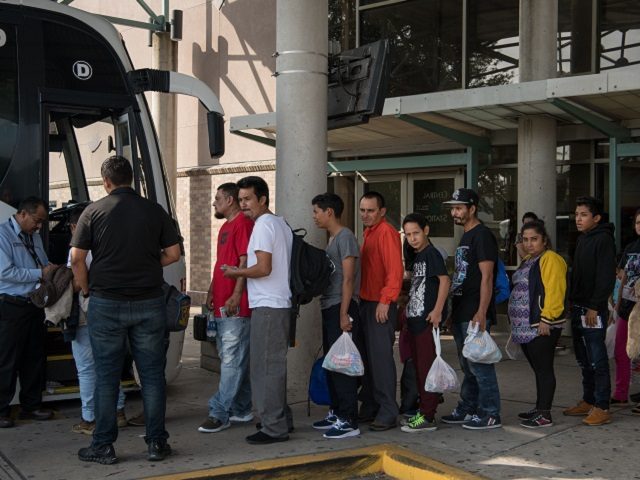U.S. Border Patrol issued instructions to begin the immediate release of migrants to avoid overcrowding in temporary holding facilities as ICE struggles to cope with increasing apprehension rates along the southwestern border.
This development follows a short-lived plan to move released migrants further inland to alleviate stress on the typically smaller border communities.
Now, ICE’s ability to transport illegal immigrants further into the United States is strained due to the new influx of migrants appearing in recent weeks, law enforcement sources tell Breitbart Texas.
In the Rio Grande Valley, more than 2,000 asylum seekers were apprehended within the last 48 hours. Sources report that at least 600 family unit members are in custody and cannot be returned to Mexico under the CDC Title 42 COVID-19 emergency order. Border Patrol agents are also struggling with the spike in single adults from Central America and far beyond the Americas.
The Rio Grande Valley has seen a 647% increase in family unit asylum seekers over the course of seven weeks. The peaks are seen across the southern border sectors, according to law enforcement sources familiar with the situation.
Prior to the cancellation the Trump administration’s agreements with Central American countries known as Asylum Cooperation Agreements (ACAs), seekers were swiftly returned to their home country when credible fear interviews disqualified them from further consideration. In addition, the Migrant Protection Protocols, also known as the Remain in Mexico Program, forced the returns of many to await hearing dates in Mexico and therefore avoided release into the United States.
Federal sources tell Breitbart Texas the order was received mid-afternoon today from CBP officials in Washington, D.C. to begin broader migrant releases as suitable detention space and nonprofit alternatives are overwhelmed.
ICE provided the following statement concerning the situation:
U.S. Immigration and Customs Enforcement (ICE) constantly evaluates its posture at Family Residential Centers to meet changing operational needs. Custody determinations are made on a case-by-case basis in accordance with US law and DHS policy. Individuals can be released from custody based on the facts and circumstances of their cases, and may be placed in alternatives to detention, including release on recognizance, or formal monitoring programs.
The categories qualifying for release, as reported by law enforcement sources, in addition to family unit members not accepted by Mexico under the CDC Title 42 COVID-19 guidelines, includes all single adult apprehensions with no criminal history in the United States.
The new development further promises to burden small border communities and NGOs to absorb the mounting humanitarian and public health crises.
Randy Clark is a 32-year veteran of the United States Border Patrol. Prior to his retirement, he served as the Division Chief for Law Enforcement Operations, directing operations for nine Border Patrol Stations within the Del Rio, Texas Sector.

COMMENTS
Please let us know if you're having issues with commenting.